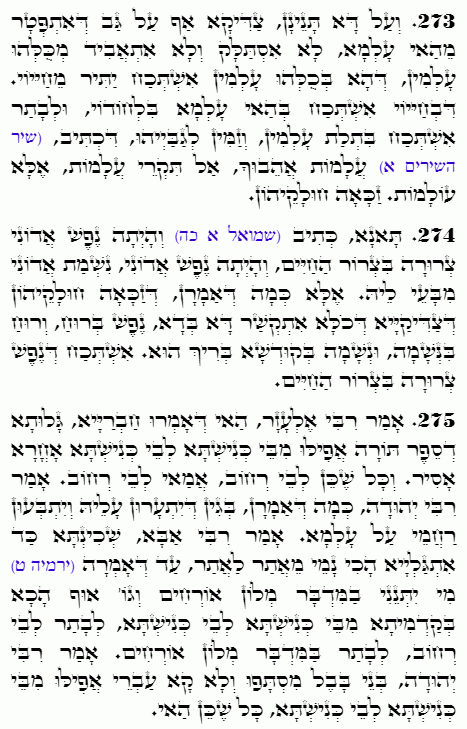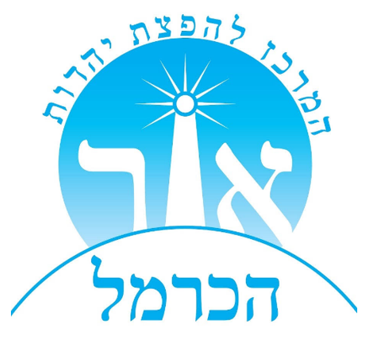Daily Zohar # 4669 – Acharei Mot – Maidens and worlds
Daily Zohar 4669

Hebrew translation:
274. לָמַדְנוּ, כָּתוּב (שמואל-א כה) וְהָיְתָה נֶפֶשׁ אֲדֹנִי צְרוּרָה בִּצְרוֹר הַחַיִּים. וְהָיְתָה נֶפֶשׁ אֲדֹנִי?! נִשְׁמַת אֲדֹנִי הָיָה צָרִיךְ לִהְיוֹת! אֶלָּא כְּמוֹ שֶׁאָמַרְנוּ, שֶׁאַשְׁרֵי חֶלְקָם שֶׁל הַצַּדִּיקִים שֶׁהַכֹּל נִקְשָׁר זֶה עִם זֶה, נֶפֶשׁ בְּרוּחַ, וְרוּחַ בִּנְשָׁמָה, וּנְשָׁמָה בַּקָּדוֹשׁ בָּרוּךְ הוּא. נִמְצָא שֶׁהַנֶּפֶשׁ צְרוּרָה בִּצְרוֹר הַחַיִּים.
275. אָמַר רַבִּי אֶלְעָזָר, זֶה שֶׁאָמְרוּ הַחֲבֵרִים, גָּלוּתוֹ שֶׁל סֵפֶר תּוֹרָה אֲפִלּוּ מִבֵּית כְּנֶסֶת לְבֵית כְּנֶסֶת אַחֵר אָסוּר, וְכָל שֶׁכֵּן לָרְחוֹב. לָמָּה לָרְחוֹב? אָמַר רַבִּי יְהוּדָה, כְּמוֹ שֶׁאָמַרְנוּ, כְּדֵי שֶׁיִּתְעוֹרְרוּ עָלֵינוּ וִיבַקְשׁוּ רַחֲמִים עַל הָעוֹלָם. אָמַר רַבִּי אַבָּא, כְּשֶׁשְּׁכִינָה גָּלְתָה כָּךְ גַּם מִמָּקוֹם לְמָקוֹם, עַד שֶׁאָמְרָה (ירמיה ט) מִי יִתְּנֵנִי בַמִּדְבָּר מְלוֹן אוֹרְחִים וְגוֹ’, אַף כָּאן בָּרִאשׁוֹנָה מִבֵּית כְּנֶסֶת לְבֵית כְּנֶסֶת, אַחַר כָּךְ לָרְחוֹב, אַחַר כָּךְ בַּמִּדְבָּר מְלוֹן אוֹרְחִים. אָמַר רַבִּי יְהוּדָה, בְּנֵי בָּבֶל פּוֹחֲדִים וְלֹא מַעֲבִירִים אֲפִלּוּ מִבֵּית כְּנֶסֶת לְבֵית כְּנֶסֶת, כָּל שֶׁכֵּן זֶה.
.
Zohar Acharei Mot
Continued from previous DZ
#273
We have learned: Even though a Tzadik has departed from this world, does not vanish and is not lost from all the worlds. He is found in all the worlds even more than during his lifetime. Because during his life, he was present only in this world, but afterward, he is present in three worlds, which are Beriah (Creation), Yetzirah (Formation), and Asiyah (Action), and he is present among them. As it is written, ‘עֲלָמוֹת אֲהֵבוּךָ’ ‘Alamot ahavucha’ (‘maidens love you’) (Songs 1)—do not read ‘alamot’ (maidens), but ‘olamot’ (worlds) “אַל תִּקְרֵי עֲלָמוֹת אֶלָּא עוֹלָמוֹת”. Fortunate is their portion.
#274
We have learned: It is written,
1 Samuel 25:29
“וַיָּקָם אָדָם לִרְדָפְךָ וּלְבַקֵּשׁ אֶת נַפְשֶׁךָ וְהָיְתָה נֶפֶשׁ אֲדֹנִי צְרוּרָה בִּצְרוֹר הַחַיִּים אֵת יְהוָה אֱלֹהֶיךָ וְאֵת נֶפֶשׁ אֹיְבֶיךָ יְקַלְּעֶנָּה בְּתוֹךְ כַּף הַקָּלַע.”
“Should anyone rise up to pursue you and to seek your life (נַפְשֶׁךָ), then the life (נֶפֶשׁ) of my lord shall be bound in the bundle of the living with YHVH your God; but the lives (נֶפֶשׁ) of your enemies He will sling out as from “כַּף הַקָּלַע,” the hollow of a sling.”
Shouldn’t it have said ‘the soul (neshamah) of my lord’? For the nefesh remains in this world, and only the neshama ascends to the bundle of life (as mentioned above in #262).”
And he answers, “But as we have said, fortunate is the portion of the Tzadikim, for everything is connected one to another: the nefesh with the Ruach, the ruach with the neshama, and the neshama with the Holy One, blessed be He (as mentioned above in #257). Thus, the nefesh is bound in the bundle of life because it is connected to the neshamah in the bundle of life.
#275
Rabbi Elazar said: “This is what the friends have said: that taking a Torah scroll into exile—even moving it from one synagogue to another—is forbidden, and all the more so taking it out into the street. So why do they bring it out into the street?”
Rabbi Yehuda replied: “As we have said, it is done so that they (the souls of the Tzadikim) will be awakened by it and will beseech mercy upon the world.”
Rabbi Abba added: “When the Shechinah went into exile, she also moved from place to place until she said,
Jeremiah 9:1
“מִי יִתְּנֵנִי בַמִּדְבָּר מְלוֹן אֹרְחִים וְאֶעֶזְבָה אֶת עַמִּי וְאֵלְכָה מֵאִתָּם כִּי כֻלָּם מְנָאֲפִים עֲצֶרֶת בֹּגְדִים.”
“Oh, that I had in the wilderness A lodging place for travelers; That I might leave my people, And go from them! For they are all adulterers, An assembly of treacherous men.”
Similarly, here, the Torah scroll was first moved from one synagogue to another, then to the street, and afterward to the wilderness—a lodging place for travelers.
Rabbi Yitzchak said: “The people of Babylonia are fearful and do not move a Torah scroll even from one synagogue to another, much less to the street.
Notes:
The passage emphasizes the tension between strict adherence to the sanctity of the Torah scroll and the urgent need to invoke Hashem’s mercy during critical times. While we need to avoid moving the Torah to prevent any potential disrespect, exceptional circumstances—such as communal distress—may warrant its movement to awaken spiritual forces and elicit compassion from Hashem.
The discussion also reflects on the symbolic journey of the Shechinah during exile, mirroring the movement of the Torah scroll. This parallel serves as a metaphor for the community’s spiritual state and its relationship with Hashem. The caution exercised by the Babylonian Jews reminds us of the varying practices among different communities, all aiming to honor the Torah while addressing the needs of the moment.
Friday would be a good day to make a ** Donation, especially if you didn’t donate in the past week. Giving on Friday, which is an aspect of Yessod, expands the vessel for the Light and honor of Shabbat.
** Your donation doesn’t have to be given to the same place every week. You can alternate or split your donation among those who benefit you spiritually.
 Support – Ohr HaCarmel Yeshiva
Support – Ohr HaCarmel Yeshiva
Tap here: Ohr HaCarmel Donation Page to make your contribution and make a spiritual connection to Israel.
The Yeshiva Ohr HaCarmel (which means the Light of the Carmel) is on top of Mount Carmel, where the prophet Elijah’s prayers were answered.

 Previous: Acharei Mot
Previous: Acharei Mot

